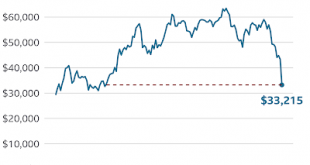Classical political economics was in part a discourse for the rising bourgeoisie, and as such most of its members – that accepted some version of the labor theory of value and that distribution was conflictive – were for laissez-faire policies. That was certainly the case of the Physiocrats, and of Adam Smith and David Ricardo, the two most accomplished of the British political economists.However, the classical analytical scheme did not assume full employment of labor or that the economic...
Read More »Bitcoins and El Salvador
I haven't written about bitcoin in a long while, in part because it is somewhat irrelevant, like all notions of a future dominance of private currencies (another of Hayek's incredible blunders; more problems with Hayek here and here). Note that nation states are fine and well, and not going anywhere, and hence national currencies will remain dominant. Only a weak state without its own currency (El Salvador is dollarized; on that see here and here) would make bitcoins legal tender. But more...
Read More »The end of Friedmanomics?
Friedman's adviseesZachary Carter, of Price of Peace fame (a good book that I recommend, btw), wrote an interesting piece on Milton Friedman's legacy, which I think is, as Hyman Minsky said of Joan Robinson's work, wrong in incisive ways. But even before we get to his main point, that the era of Friedmanomics is gone, it is worth thinking a bit about the way he approaches the history of ideas. This is clearly a moral tale for Carter, with good guys and bad guys. Gunfight at high noon. It is...
Read More »Sovranità democratica e internazionalismo autentico
Articolo su Il Fatto quotidiano, 22 agosto 2018 Sovranità democratica e internazionalismo autentico Sergio Cesaratto Per molti opinionisti il termine “sovranità nazionale” è diventato sinonimo dei più gretti sentimenti politici: nazionalismo, razzismo, rosso-brunismo, neo-fascismo. Forse è il caso di introdurre qualche distinguo in quella che appare una strumentalizzazione volta a mettere nello stesso calderone ispirazioni politiche ben diverse. Una confusione che trova la sua...
Read More »The end of neoliberalism?
A while ago I promised to return to this topic and discuss Mirowski's reply in the INET debate to my comment on his paper. And yes it's been quite a while since that debate. At any rate, I was at the Political Economy of World Systems (PEWS) conference last weekend, and we had some time to discuss Wallerstein (with him, I'm glad to say), his views on the structural crisis of capitalism. And someone (can recall who did) said something to the effect that the collapse of the economy in 2008...
Read More »Yes, Virginia, Hayek was a Liquidationist in 1932
But you won’t know it from the weird Hayek apologists and Free Bankers who have essentially rewritten history to make it seem as if Hayek was in favour of MV stability by monetary stimulus and central bank intervention during the early years of the Great Depression (see here for a full discussion).Not too long ago I had a run in with some of the Hayekian True Believers on Twitter.One of them cited the second part of Hayek’s review of Keynes’ Pure Theory of Money (see Hayek 1932; the first...
Read More »The Filthy Anti-Capitalist Mentality – of Austrian Economics
And I mean the anti-capitalist mentality of the Austrian libertarian cult and certainly in its Rothbardian form, because – make no mistake – these people are anti-capitalist in their core ideological beliefs, no matter how much we have to hear of their blustering nonsense.Let us take the crucial points which make Austrian libertarianism anti-capitalist: (1) Opposition to fractional reserve banking Rothbardians and many other Austrian libertarians oppose even private capitalist fractional...
Read More » Heterodox
Heterodox




